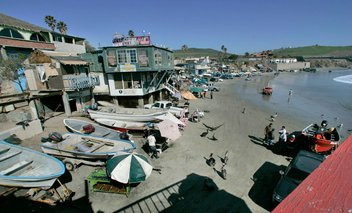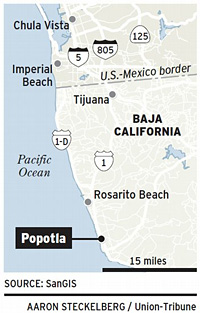
|  |  |  News Around the Republic of Mexico News Around the Republic of Mexico  
Baja Village has Become Smugglers’ Launch Point
 Leslie Berestein - San Diego Union-Tribune Leslie Berestein - San Diego Union-Tribune
go to original
March 01, 2010


| Popotla’s activity and proximity to the border make it an attractive spot for smugglers to take to the sea with their human cargo, U.S. and Mexican officials say. (Peggy Peattie/Union-Tribune)

For more photos of the Mexican fishing village of Popotla, go to uniontrib.com/popotla |  |
Until a couple of years ago, the small fishing village of Popotla south of Rosarito Beach was a tourist haven. Visitors from north of the border, as well as from Tijuana, came down on weekends to shop for pottery or ironwork, or to sample fresh seafood in one of the many small restaurants lining its crescent-shaped cove.

Since that time, Popotla has become known as a haven for something else. The village, which has fallen on hard times since tourism dried up in the face of Baja California’s drug war and tighter travel restrictions, has become the main launching point for smugglers ferrying illegal immigrants into the United States by sea.

Although there are other launching sites, including the village of La Salina several miles to the south, U.S. and Mexican authorities say Popotla’s combination of activity and proximity to the border has made it an ideal spot for smugglers to set up shop.

Locals, while loath to discuss details, are aware of it. Some residents of a mobile-home park have observed mysterious light signals on the water. Residents who work on the beach have heard about what happens there at night but prefer to turn the other way.

“I haven’t seen them, but everyone knows about it,” said the owner of a small restaurant on the beach, who like several others interviewed for this story did not wish to be identified for fear of their safety. “But what can we say? They come at night. We don’t see them.”

Popotla is directly south of Baja Studios, the oceanfront shooting location for “Titanic” and several other films. The village, which is part of the Rosarito Beach municipality, consists of a main boulevard lined with artisan shops, metal and woodwork stores and art galleries, a mobile-home park occupied mostly by retired Americans, and a fishing village where the waterfront is crowded with colorful pangas, small wood or fiberglass boats used by local fishermen. The same type of boat is used by smugglers.

What makes Popotla ideal for maritime smuggling, according to U.S. immigration authorities, is that it buzzes with legal seafaring activity. The beach is often full of fishermen coming and going, fish sellers weighing and hawking their wares, and locals eyeing the day’s catch.

“The smugglers want to utilize a location where there is legitimate traffic, legitimate activity they can attempt to blend in with,” said Mike Carney, deputy special agent in charge of U.S. Immigration and Customs Enforcement in San Diego. “With the vehicle traffic, the boat traffic and the access to the sea, it makes it a great location for the smugglers.”

The city of Rosarito Beach reported a drop in its crime rate last year. However, organized crime continues to plague Baja California, with drug and human smugglers becoming ever more competitive and creative in the ways they attempt to move their cargo north.

 For human smugglers, this includes carrying boatloads of illegal immigrants along the coast at night and landing before dawn in San Diego County and even in southern Orange County, where abandoned boats have turned up on beaches recently. For human smugglers, this includes carrying boatloads of illegal immigrants along the coast at night and landing before dawn in San Diego County and even in southern Orange County, where abandoned boats have turned up on beaches recently.

The trend began in earnest about three years ago, with apprehensions in boat-related smuggling incidents off San Diego County jumping from 35 to 152 between fiscal 2007 and 2009. More than 140 illegal immigrants have been arrested in maritime smuggling incidents off the county’s coast since October.

Being smuggled in by sea is among the most expensive of illicit trips across the border from Mexico, with the rate per passenger as high as $5,000.

“If they bring in 20 people, that’s $100,000,” said Jorge Eduardo Montero, secretary of public safety for Rosarito Beach. “That is an awful lot of money. It’s very lucrative.”

In January, the San Diego region’s first known fatalities tied to maritime smuggling occurred when two immigrants, a man from Mexico and a woman from Guatemala, died after the panga they were in capsized off Torrey Pines State Beach. According to U.S. officials, the boat is believed to have taken off from Popotla.

That same month, Mexican authorities intercepted a suspected smuggling boat preparing to take off from the village with more than 20 individuals. Montero said the smuggler was posing as a local fisherman. According to U.S. authorities, relatively few locals have been known to get caught up in the human-smuggling trade. The smuggling organizations operate outside Popotla, only shuttling their clients into town to send them off. Two Popotla residents have been arrested as suspected human smugglers by U.S. Immigration and Customs Enforcement since last October; other smugglers arrested since then have hailed from other Mexican coastal towns, mostly farther south.

The smugglers don’t launch until after dark, according to authorities, by which time the beach’s daytime traffic has subsided, though fishing boats also launch at night. Locals who work on the beach say they stay out of the way.

“We don’t have time to look at that, because all we’re doing is selling fish,” said a man displaying three freshly caught small sharks he had bought from local fishermen. “We’re not going to come here at night.”

A retired American who is a resident of the mobile-home park overlooking the cove said some residents had seen curious mirror signals on the water. Another resident said she had wondered about a Mexican military vessel she had observed lingering off the coast.

It’s unclear if there is any connection between Popotla’s economic downturn and smugglers moving in. Tourist-dependent Rosarito Beach in general has suffered a lack of revenue.

“This whole town survives on tourism,” said Valvina Sánchez, 63, of Alfarreria Tlaquepaque, a pottery shop that has lost so much business that her co-owner husband has had to take odd jobs in Ensenada. “All of Rosarito does. If it ends, we end. What else are we going to work in?”

Not far from the shop, a former tourist motel sits vacant, covered with graffiti. At the entrance to town, a once-popular sports bar was recently shuttered.

Like others in town, Sánchez blamed the decline of tourism in Rosarito Beach and Popotla on negative publicity from the drug-cartel violence of recent years, which has scared off most of the day-trippers from the north.

Unfortunately, the resulting lack of employment creates the potential for other problems, said Patricia Escamilla, an expert on border security and public administration at the Colegio de la Frontera Norte, a research group north of Rosarito Beach.

“You have lots of people, especially young people, who have no alternatives, no opportunities, no way of moving up. There are no jobs, and if there are jobs, they are really bad,” Escamilla said. “What little work they might find from organized crime is much more attractive than just staying where they are.”

Hawking his sharks on the beach — “good for shark tacos,” he said — the fish-seller in the cove said there’s nothing to be gained from associating with the unlawful element that moves through Popotla at night.

“We sell fish,” he said. “Then we go home.”
|

 |
|  |



